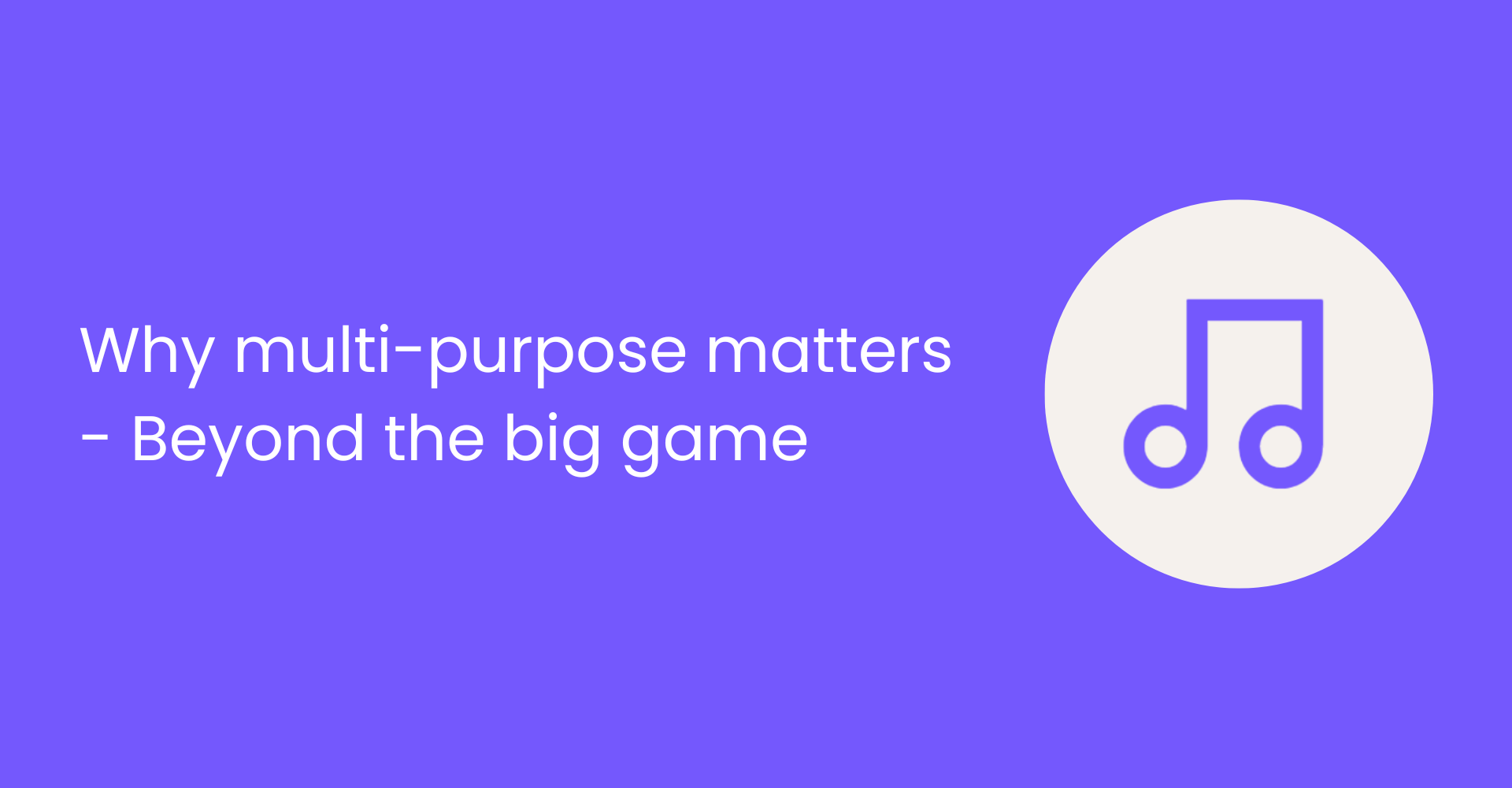Built for more: A case for versatility in event strategy

Today's sports and entertainment venues are built to impress, wowing audiences while their stadium operations work hard behind the scenes. If you're in venue management, you'll know a profitable venue depends on a diverse event strategy that keeps the doors open and the seats filled year-round. It’s what keeps your venue relevant, your brand visible, and your revenue on track.
Running a venue that never stands still
Managing a modern venue means dealing with complexity from day one, especially if your venue is home to more than one professional sports team. You’re juggling different fan bases, distinct branding, and unique event-day experiences, all within the same walls. And your event strategy often goes beyond the main arena. Many venues sit at the heart of larger mixed-use developments. For example, SoFi Stadium is part of the much larger complex of Hollywood Park. These mixed-use developments offer facilities such as outdoor plazas, retail centers, and other flexible spaces, meaning they can host multiple events at once or combine for one unforgettable spectacle.
This versatility is a huge advantage, but it means your stadium operations need exceptional coordination and the right technology to keep it all running smoothly.
If your venue has invested billions in construction, you can’t rely on a handful of home games to deliver ROI. The ability to switch between event types, fill the calendar, and run fixtures, shows, and experiences concurrently is what keeps your revenue flowing.
To make that happen, you need systems that handle multiple resident teams, create tailored experiences for different audiences, and give you the flexibility to get the most out of every space, every day.
Booking events that keep your venue busy and profitable
A big multi-purpose space is a major investment, and your event strategy needs to work hard to get the most from it. Relying on a handful of sports games won’t cut it. To keep revenue flowing year-round, you need to fill your calendar with a variety of events that make the most of every space you have.
Perhaps you’re already promoting your “Host an Event” capabilities, marketing your premium areas like the field, club levels, and concourse for private events, corporate gatherings, and special activations. If so, you’ll have seen that the demand is there. From conferences and corporate events to social celebrations, each event adds to your income and keeps your venue active, even in the off-season.
Have you also tried looking at underused spaces with fresh eyes? Transforming these overlooked corners into bookable areas not only creates new revenue streams but can also give guests a unique, unexpected experience that sets your venue apart.
Strategies to get more from your event spaces
Here are some practical ways to make your spaces work harder and bring in more bookings as part of your wider event strategy:
- Promote your spaces proactively: Don’t wait for inquiries to land in your inbox. Actively market your most appealing areas for private events, corporate gatherings, film shoots, and more. Show how flexible they are and let the design and atmosphere speak for themselves.
- Show what’s possible: Share high-quality photos and videos from past events, along with client testimonials, on your website and social media. Help potential clients picture their own event in your venue.
- Reach the right audience: Build an email list from past clients and inquiries, then send personalized updates about available spaces, seasonal offers, or event packages. Use targeted online ads and post on event listing sites your audience already uses.
- Add more value at booking: Train your sales teams to suggest extras like event packages, venue tours, or premium catering during the booking process. It’s a simple way to enhance the guest experience and increase the value of each booking.
By building these tactics into your event strategy, you can keep your venue active year-round, strengthen your brand, and make sure you’re getting the most from every space you manage.
The teamwork that powers your stadium operations
If you’re involved in venue management, you’ll know how big, busy, and tech-heavy it can get. To add to the challenge, IT, marketing, and stadium operations teams often work in silos, even though their goals overlap. That disconnect can slow you down and leave fans with a disjointed experience.
Technology is the bridge that changes this. With the right systems in place, every team gets the same real-time data, the same insights, and the same tools to act quickly. That’s when collaboration becomes natural instead of forced.
IT teams are your unsung heroes. They build the high-speed WiFi networks that keep your data flowing smoothly and integrate multiple systems so everything works together without a hitch.
Marketing and fan engagement teams bring your event strategy to life, always looking to raise the bar when engaging fans. By personalizing interactions and creating standout moments, from mobile apps and AR experiences to messaging platforms, they turn excitement into ticket sales and merchandise buys.
Stadium operations teams make sure every event runs smoothly. They manage crowd flow, concessions, maintenance, and security. And now with real-time data and location-based tools, they can make smart, on-the-spot decisions and be more flexible to handle the varied demands of your events.
When these teams share data, insights, and tools, you can unlock richer fan experiences, give marketing a clearer picture of what’s working, and help stadium operations run every event seamlessly. The right solutions don’t just make life easier for IT; they add value to every department and keep your venue performing at its best.
Balancing your calendar with the right mix of events
To build a strong event strategy, you need to think beyond just filling dates. You need to consider the value of each type of event you host. Sports will always be a solid part of your plan, but concerts and other non-sporting events can be just as important for your bottom line - sometimes even more!
Some arenas make nearly twice as much from a single concert as they do from a typical sports game. It’s why new venues are often designed with concerts in mind. With global concert revenue hitting $34.5 billion in 2023, up 29% from the year before, the demand is huge. And it’s expected to grow even more in 2025. In North America, stadium crowds for live concerts are already up 12% this year, based on figures through May. But fans aren't just showing up for the music; they want the whole experience, from the staging and production to the atmosphere in the crowd. Big tours often sell out months in advance, with high ticket prices that fans are happy to pay.
And it's not only music that can pack your venue and boost revenue. Global spectacles like the FIFA World Cup or WrestleMania bring in massive audiences, create a buzz that lasts long after the event, and put your venue firmly in the spotlight. The sweet spot is a calendar that mixes reliable sports fixtures with high-impact events that attract new crowds and keep your venue busy all year.
Making the most of a diverse event calendar
Here are some ways to shape your event strategy so it delivers the right mix of events and keeps your venue performing at its best:
- Plan for balance, not just volume: It’s not about cramming in as many concerts as you can. Aim for a mix of high-impact, high-profit events that work for your space and your schedule. This takes smart stadium operations planning so you can switch quickly between very different event types.
- Play to profitability: Big concerts can sometimes bring in more per night than many sports fixtures. Factor that into your booking decisions so you’re going after the events that bring in the most for your venue.
- Stay agile behind the scenes: Use tools and processes that help you create different experiences for different audiences. Switching from a packed sports crowd to a sold-out concert should feel effortless to your visitors - and easy for your teams to manage.
Get this balance right, and your calendar will be working harder for your venue all year long.
Sports vs. concerts: where’s the bigger opportunity?
Here's a quick side-by-side look at how major sports events and concerts stack up for large, multi-purpose venues - both in revenue potential and in the strategic value they bring to your event strategy.
The strongest calendar will mix all three – giving you the steady income of sports, the big wins from concerts, and the global spotlight of major one-off events to keep your venue thriving all year.
Take the Next Step in Your Playbook
Ready to dive deeper? Discover how integrated data unlocks personalized fan journeys and smarter operations, or test your knowledge of modern fan expectations with our interactive Myths vs. Facts quiz.






.png)





